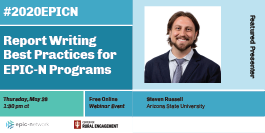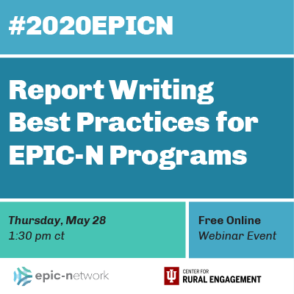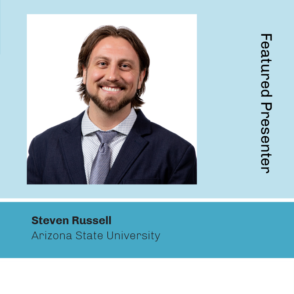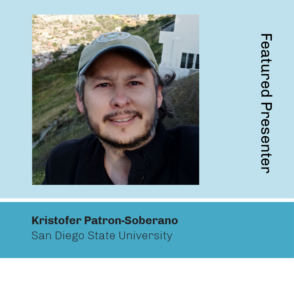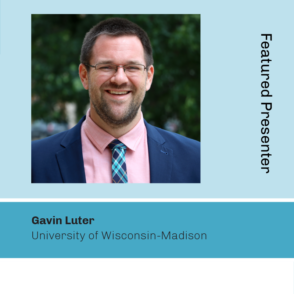Report Writing Best Practices for EPIC-N Programs
Featuring: Gavin Luter, Kristofer Patrón-Soberano, and Steve Russell
May 28, 1:30 pm – 2:30 pm CT
This webinar is part of the free #2020 EPIC-Network Webinar Series. As part of the transition from an in-person conference to a free, and online, event series, this webinar is open for anyone to attend. After the event ends, its recording will be posted to this page. So even if you cannot attend, you can still engage with its content.
Webinar Description
It’s the end of the semester and it’s time to start on that class summary report. You have ten student papers, zero extra hours in the day, and minimal resources to write it. Now… GO! Join this panel discussion to hear from different programs on their structure and approach to summary report production; what works, what doesn’t and what can we do better? How do you pull off high-quality, value-add reports in a timely manner?
Resources and Recording from the Webinar
The #2020EPICN Free Webinar Series ended June 30, 2020. Free access to the event’s recordings and resources is now available only to EPIC-N Members. Membership is now FREE to assist in the global response and recovery to COVID-19. Sign up today to gain access to the recordings and resources from this event and all of the other benefits associated with EPIC-N Membership*.
*Read about the benefits and non-financial terms of membership.
Presenter Bios
Gavin Luter received his Ph.D. in educational administration from the University of Buffalo in 2015. He holds a Master’s of Science degree in the higher education administration from the University of Tennessee-Knoxville and a Bachelor’s of Arts degree from Virginia Polytechnic Institute and State University in public and non-profit management. He is the Managing Director of the UniverCity Alliance at the University of Wisconsin-Madison. Most recently, Luter served as the Executive Director of Wisconsin Campus Compact where he worked with 32 colleges and universities across Wisconsin to advance community-based learning and community engagement on those campuses. He oversaw the launching of the WI Campus Compact Impact project, a public-private mapping partnership where engagement efforts of member campuses were displayed online. While pursuing his doctorate, he published several peer-reviewed articles and served as guest editor of a peer-reviewed academic journal on community-school-university partnerships and the intersection of school reform and neighborhood development. As part of his project work with the University at Buffalo Center for Urban Studies, Luter served as education planning director of the US Department of Housing and Urban Development’s Choice Neighborhood initiative where he worked to secure over $16 million in commitments from 45 different philanthropic and higher education partners to create a neighborhood-linked education system. Luter also oversaw the Center’s neighborhood development internship program where college students operated an in-school project-based learning enrichment program for middle school students centered on neighborhood-based problem solving. At the United Way of Greater Knoxville, Luter managed a Bill and Melinda Gates Foundation regional teacher effectiveness advocacy and coalition-building grant project. At the University of Tennessee-Knoxville’s (UTK) Howard H. Baker Jr. Center for Public Policy, Luter developed and coordinated an undergraduate student living-learning community experience for students interested in public service and civic engagement.
Kristofer Patrón-Soberano is an economist from the Autonomous University of Sinaloa, Mexico, but turned green by deciding to study a master’s degree in environmental management at El Colegio de la Frontera Norte (El Colef) in Tijuana. His research focused on the economic valuation of natural resources, and binational collaboration and US-Mexico governance. After graduating from the master’s program, he continued working at El Colef as coordinator of border projects. Kristofer also served as deputy director for Tijuana’s Environmental Protection Agency. There, he developed novel programs such as Replicadores Ambientales (Environmental Replicators) to strengthen local environmental education, and Comuniparques to rehabilitate green public spaces in Tijuana’s most vulnerable areas. Now, as part of the Sage Project at San Diego State University, Kristofer hopes to keep contributing to the sustainable development of the region.
Steve Russell is the Program Manager of Project Cities, an EPIC-N initiative of the Sustainable Cities Network at Arizona State University. Russell holds a Master’s Degree in Public Administration and Bachelor’s Degrees in Sociology and Interdisciplinary Studies, also from ASU. His most recent professional roles include directing the local food program at the nation’s largest coalition of local businesses, Local First Arizona, and launching a carbon management and urban forestry pilot program for ASU. Russell is a current member of the City of Tempe’s Sustainability Commission, and has held numerous past public service roles, including: a term of service with AmeriCorps, a seat on the Arizona Department of Education’s Farm to School Advisory Committee, and founding membership in the Maricopa County Healthy Local Food Systems Coalition.
More about the #2020 EPIC-Network Webinar Series
Usually only paying EPIC-N Members can attend and review recordings of the EPIC-N Webinars. This event is different. Until June 30, anyone can engage in this contact! After June 30, recordings are posted to the EPIC-N Member Commons, a password protected space for member programs to access the full range of resources EPIC-N provides. Details about membership can be found here.
